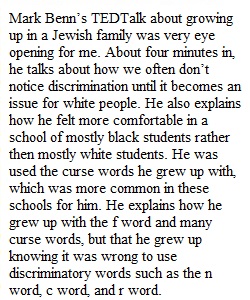


Q Unit II/Module 3 Discussion For this module, respond to one or more of the following prompts to explore the content in more detail. 1. Watch the Mark Benn TEDTalk and post any comments/reactions here. I'm leaving this one open-ended on purpose.... 2. Consider the following case example. Your client experiences significant hearing loss and is accompanied by a sign language interpreter to their counseling appointment. During the session, it becomes clear to you that the interpreter is "adding on" information to what is being shared with the client. Moreover, it is clear the client is asking questions of the interpreter that are not being shared with you. After the client has left, you engage in a conversation with the interpreter at which point they report to you that they made sure the client received the information needed from the session as they were looking for someone more "directive" who would give some "advice". Additionally, the interpreter indicated the client needed a ride home and that they were offering that to the client after the session. (As a side note, all of the interpreters I have worked with over the years have been VERY effective at their job and monitor these roles and boundaries very carefully - they also are governed by professional ethics, so these situations should be few and far between or simply never occur. The situation is merely hypothetical and has multiple layers created for us to consider how one might address them if they were to occur). What are the various multicultural considerations that might be relevant in this scenario? Ethical considerations? How might you address them in a professional setting? 3. For this discussion thread, you are also welcome to post your own original questions to the class for consideration.
View Related Questions